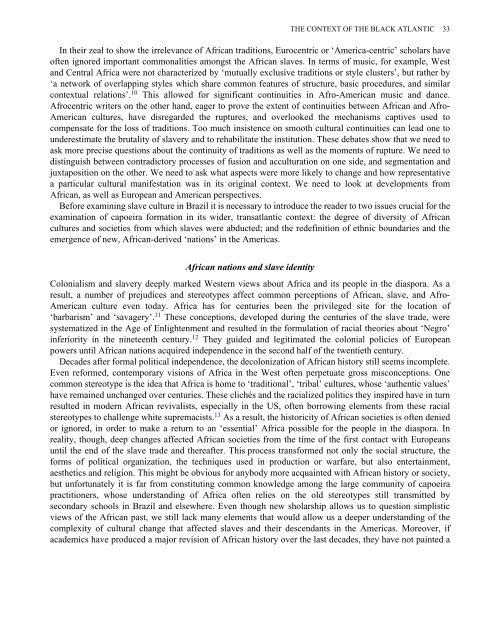Capoeira: The History of an Afro-Brazilian Martial Art
Capoeira: The History of an Afro-Brazilian Martial Art
Capoeira: The History of an Afro-Brazilian Martial Art
You also want an ePaper? Increase the reach of your titles
YUMPU automatically turns print PDFs into web optimized ePapers that Google loves.
In their zeal to show the irrelev<strong>an</strong>ce <strong>of</strong> Afric<strong>an</strong> traditions, Eurocentric or ‘America-centric’ scholars have<br />
<strong>of</strong>ten ignored import<strong>an</strong>t commonalities amongst the Afric<strong>an</strong> slaves. In terms <strong>of</strong> music, for example, West<br />
<strong>an</strong>d Central Africa were not characterized by ‘mutually exclusive traditions or style clusters’, but rather by<br />
‘a network <strong>of</strong> overlapping styles which share common features <strong>of</strong> structure, basic procedures, <strong>an</strong>d similar<br />
contextual relations’. 10 This allowed for signific<strong>an</strong>t continuities in <strong>Afro</strong>-Americ<strong>an</strong> music <strong>an</strong>d d<strong>an</strong>ce.<br />
<strong>Afro</strong>centric writers on the other h<strong>an</strong>d, eager to prove the extent <strong>of</strong> continuities between Afric<strong>an</strong> <strong>an</strong>d <strong>Afro</strong>-<br />
Americ<strong>an</strong> cultures, have disregarded the ruptures, <strong>an</strong>d overlooked the mech<strong>an</strong>isms captives used to<br />
compensate for the loss <strong>of</strong> traditions. Too much insistence on smooth cultural continuities c<strong>an</strong> lead one to<br />
underestimate the brutality <strong>of</strong> slavery <strong>an</strong>d to rehabilitate the institution. <strong>The</strong>se debates show that we need to<br />
ask more precise questions about the continuity <strong>of</strong> traditions as well as the moments <strong>of</strong> rupture. We need to<br />
distinguish between contradictory processes <strong>of</strong> fusion <strong>an</strong>d acculturation on one side, <strong>an</strong>d segmentation <strong>an</strong>d<br />
juxtaposition on the other. We need to ask what aspects were more likely to ch<strong>an</strong>ge <strong>an</strong>d how representative<br />
a particular cultural m<strong>an</strong>ifestation was in its original context. We need to look at developments from<br />
Afric<strong>an</strong>, as well as Europe<strong>an</strong> <strong>an</strong>d Americ<strong>an</strong> perspectives.<br />
Before examining slave culture in Brazil it is necessary to introduce the reader to two issues crucial for the<br />
examination <strong>of</strong> capoeira formation in its wider, tr<strong>an</strong>satl<strong>an</strong>tic context: the degree <strong>of</strong> diversity <strong>of</strong> Afric<strong>an</strong><br />
cultures <strong>an</strong>d societies from which slaves were abducted; <strong>an</strong>d the redefinition <strong>of</strong> ethnic boundaries <strong>an</strong>d the<br />
emergence <strong>of</strong> new, Afric<strong>an</strong>-derived ‘nations’ in the Americas.<br />
Afric<strong>an</strong> nations <strong>an</strong>d slave identity<br />
THE CONTEXT OF THE BLACK ATLANTIC 33<br />
Colonialism <strong>an</strong>d slavery deeply marked Western views about Africa <strong>an</strong>d its people in the diaspora. As a<br />
result, a number <strong>of</strong> prejudices <strong>an</strong>d stereotypes affect common perceptions <strong>of</strong> Afric<strong>an</strong>, slave, <strong>an</strong>d <strong>Afro</strong>-<br />
Americ<strong>an</strong> culture even today. Africa has for centuries been the privileged site for the location <strong>of</strong><br />
‘barbarism’ <strong>an</strong>d ‘savagery’. 11 <strong>The</strong>se conceptions, developed during the centuries <strong>of</strong> the slave trade, were<br />
systematized in the Age <strong>of</strong> Enlightenment <strong>an</strong>d resulted in the formulation <strong>of</strong> racial theories about ‘Negro’<br />
inferiority in the nineteenth century. 12 <strong>The</strong>y guided <strong>an</strong>d legitimated the colonial policies <strong>of</strong> Europe<strong>an</strong><br />
powers until Afric<strong>an</strong> nations acquired independence in the second half <strong>of</strong> the twentieth century.<br />
Decades after formal political independence, the decolonization <strong>of</strong> Afric<strong>an</strong> history still seems incomplete.<br />
Even reformed, contemporary visions <strong>of</strong> Africa in the West <strong>of</strong>ten perpetuate gross misconceptions. One<br />
common stereotype is the idea that Africa is home to ‘traditional’, ‘tribal’ cultures, whose ‘authentic values’<br />
have remained unch<strong>an</strong>ged over centuries. <strong>The</strong>se clichés <strong>an</strong>d the racialized politics they inspired have in turn<br />
resulted in modern Afric<strong>an</strong> revivalists, especially in the US, <strong>of</strong>ten borrowing elements from these racial<br />
stereotypes to challenge white supremacists. 13 As a result, the historicity <strong>of</strong> Afric<strong>an</strong> societies is <strong>of</strong>ten denied<br />
or ignored, in order to make a return to <strong>an</strong> ‘essential’ Africa possible for the people in the diaspora. In<br />
reality, though, deep ch<strong>an</strong>ges affected Afric<strong>an</strong> societies from the time <strong>of</strong> the first contact with Europe<strong>an</strong>s<br />
until the end <strong>of</strong> the slave trade <strong>an</strong>d thereafter. This process tr<strong>an</strong>sformed not only the social structure, the<br />
forms <strong>of</strong> political org<strong>an</strong>ization, the techniques used in production or warfare, but also entertainment,<br />
aesthetics <strong>an</strong>d religion. This might be obvious for <strong>an</strong>ybody more acquainted with Afric<strong>an</strong> history or society,<br />
but unfortunately it is far from constituting common knowledge among the large community <strong>of</strong> capoeira<br />
practitioners, whose underst<strong>an</strong>ding <strong>of</strong> Africa <strong>of</strong>ten relies on the old stereotypes still tr<strong>an</strong>smitted by<br />
secondary schools in Brazil <strong>an</strong>d elsewhere. Even though new sholarship allows us to question simplistic<br />
views <strong>of</strong> the Afric<strong>an</strong> past, we still lack m<strong>an</strong>y elements that would allow us a deeper underst<strong>an</strong>ding <strong>of</strong> the<br />
complexity <strong>of</strong> cultural ch<strong>an</strong>ge that affected slaves <strong>an</strong>d their descend<strong>an</strong>ts in the Americas. Moreover, if<br />
academics have produced a major revision <strong>of</strong> Afric<strong>an</strong> history over the last decades, they have not painted a




